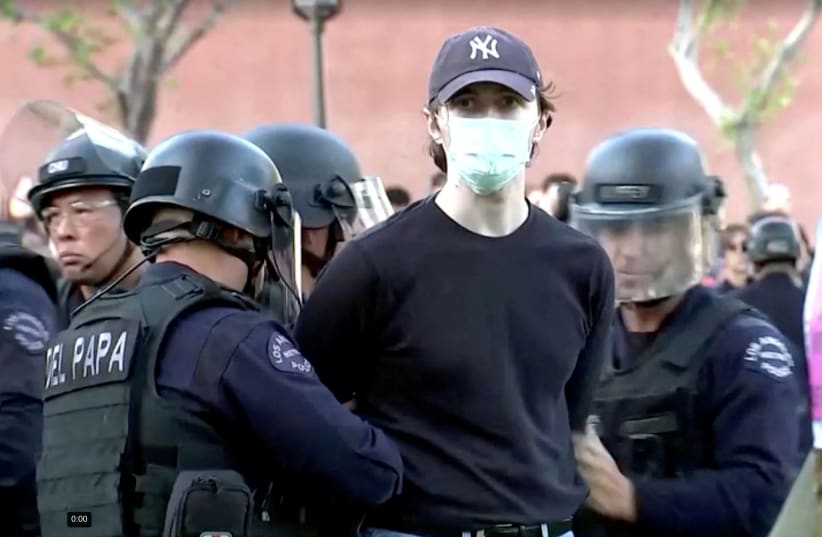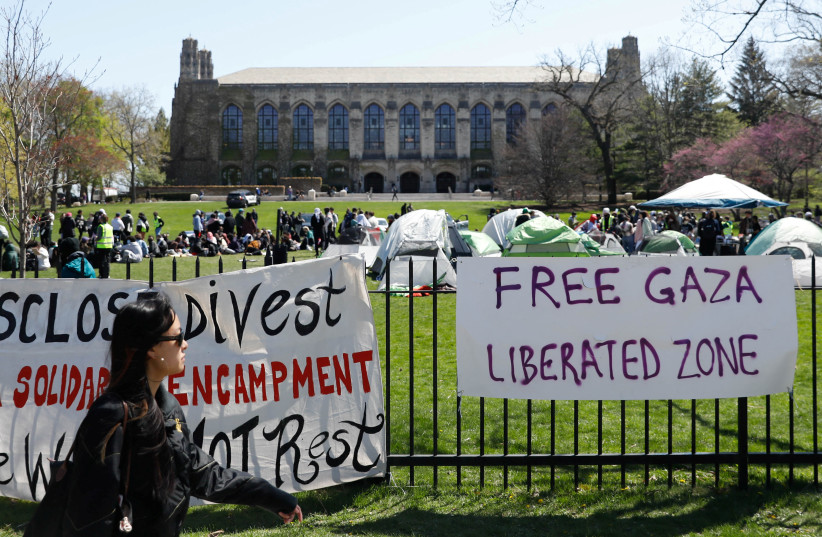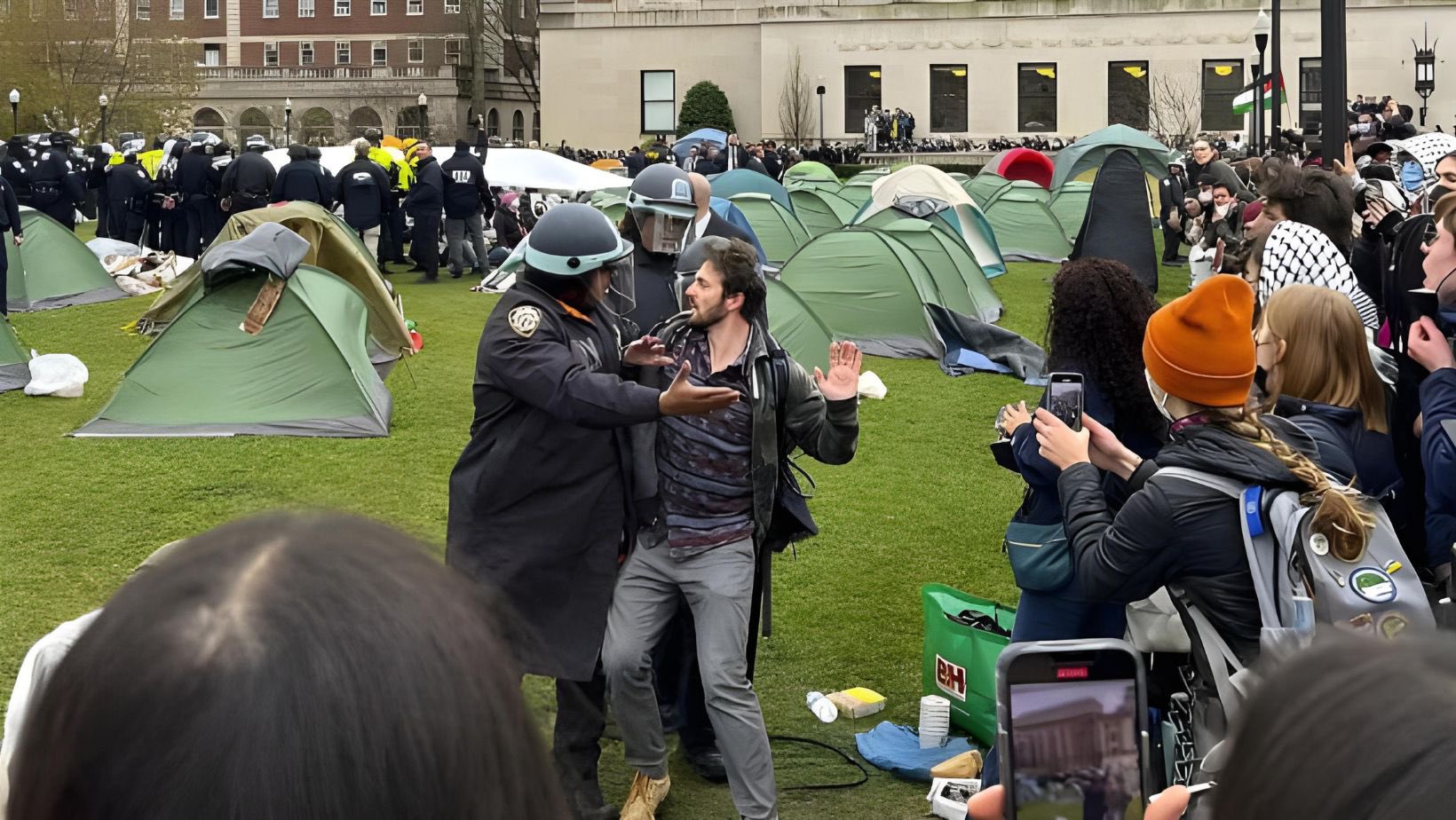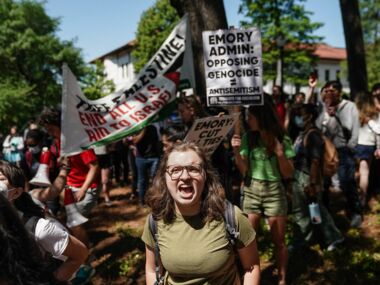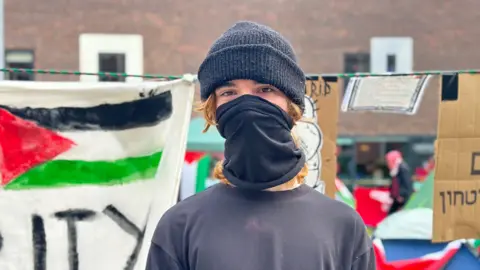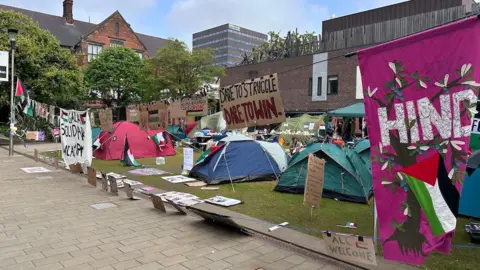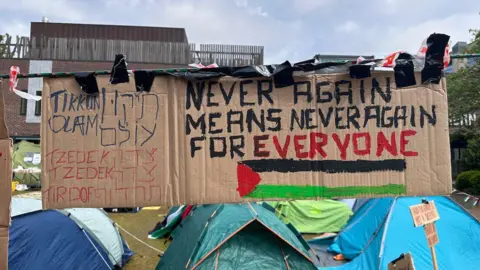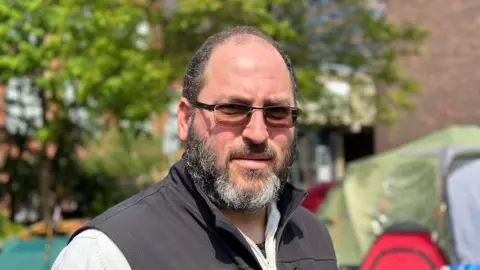[05/May/2024]
SANA'A May 05. 2024 (Saba) - The United States of America continues its moral decline, its arrogance, its support , its blatant bias toward the Zionist enemy entity, and its suppression of anyone who dares to criticize this usurping entity, demonstrate against it, or reject the genocidal war it is committing in Gaza.
In this context, media reports reported that America, more than 200 days after the ongoing barbaric aggression against Gaza, continues its arrogance and blatant bias towards the Zionist enemy entity, in a shocking loss and decline of its “moral compass” not only on the external level, but also beyond. The American house front is to suppress anyone who dares to criticize the occupying entity, demonstrate against it, or reject the genocidal war in Gaza.
It stated that this decline has reached the point of dragging university professors, suppressing students, demonizing them, throwing them in prisons, or trampling on them, spraying them with dirty water, and using all the methods used by tyrannical police states in a scene that will leave a profound impact in continuing the collapse of America’s image and the fall of the alleged “Statue of Liberty” in a democracy that has revealed itself. Its true, ugly face that the whole world suffered from.
It pointed out that this decline did not stop at this point, but rather went beyond that, as America threatened and intimidated the International Criminal Court after its talk about the possibility of issuing arrest warrants against the leaders of the Zionist enemy entity because of their crimes against humanity in Gaza, led by Netanyahu and the leaders of his war council. Which sparked the madness and obsession of the Zionist enemy and the Biden administration alike.
Writer and political analyst Yasser Al-Zaatara commented on America’s reactions to the ICC, saying: “The Americans’ hysteria against the ICC began to please Netanyahu! While the Biden administration did not show a strong reaction to the court’s intention to issue an arrest warrant against Netanyahu, Gallant, and Halevy, it A frantic congressional campaign against her began.
Al-Zaatarah pointed out that Netanyahu urged Biden to "intervene" during their call, while the latter's lack of action was explained by an attempt to pressure Netanyahu to pass the possible truce , exchange deal, with it and before it, the implementation of the conditions of the possible path of normalization with Saudi Arabia.
Palestinian writer Abdel Bari Atwan exposed the secrets of the escalation and the upcoming American militancy and what is planned to be implemented in order to save the deep American state, saying: “In short, the state of American diplomatic frenzy led personally by President Joe Biden and his Secretary of State Anthony Blinken these days, to urgently reach a ceasefire.” The fire and exchange of prisoners between the Hamas movement and the Zionist enemy entity comes not out of mercy, or out of concern to stop the war of genocide and ethnic cleansing in the Gaza Strip, but rather for purely American internal reasons imposed by the student revolution in the rising American universities, and it could lead to a civil war, comprehensive and radical change. “In the American political map that has been rooted since the end of World War II, its most prominent title is absolute support for the occupying entity and preventing its fall.”
He added: “The deep American state is trembling in horror from the outbreak of this war, in the depths of its university citadels and from future rulers , voters, and its focus on the Zionist massacres that have been continuing for more than 205 days in the Gaza Strip, the escalation of its flames, and the expansion of its circle, whether within the United States itself or in various countries.” The universities of the world are therefore exercising unprecedented pressure on America’s Arab allies, especially the mediators in Egypt and Qatar, to accelerate reaching an agreement. Stopping the war in Gaza means stopping the revolution in American universities, reducing its dangers , ramifications, and nipping it in its cradle.”
Atwan stressed that this student revolution, which broke the false connection between anti-Zionism and anti-Semitism, reminds this deep state that its counterpart, which exploded at the height of the Vietnam War era, was the one that played a major role in the American defeat and the overthrow of President Johnson, and its sister, which broke out in the universities. In 1968, it was France that overthrew President Charles de Gaulle, the hero of the liberation war in his country, and the same thing was repeated, represented by the overthrow of the apartheid regime in South Africa, and the transfer of the great leader Nelson Mandela from prison to the presidential residence.
The Zionist enemy entity is the largest recipient of American foreign aid since World War II, and according to official American indicators, the total aid provided by America to this entity between 1946 and 2023 amounted to about 158.6 billion dollars.
It is noteworthy that most of the American aid to this usurping entity goes to the military sector, as the volume of military aid between 1946 and 2023, according to official American estimates, amounted to about 114.4 billion dollars, in addition to about 9.9 billion dollars for missile defense.
Observers believe that American democracy will always remain lame, constantly losing influence until the fall of the dollar as the global reserve currency and the United States enters a paralyzing recession, at which time it will immediately face a massive contraction in its military machine.
J.A
:quality(70)/cloudfront-eu-central-1.images.arcpublishing.com/thenational/TXV2XUY4UE52D3VFLREF7XVQGQ.jpg)
:quality(70)/cloudfront-eu-central-1.images.arcpublishing.com/thenational/GUHGZBJJKUML52USYGWI2F3WLE.jpg)
:quality(70)/cloudfront-eu-central-1.images.arcpublishing.com/thenational/MI3R7C6BDNBEHBAOMXO7A76BTU.jpg)
:quality(70)/s3.amazonaws.com/arc-authors/thenational/d407096a-c389-46fe-b5d7-277bfe8ada8f.png)

%20s.jpg)

















